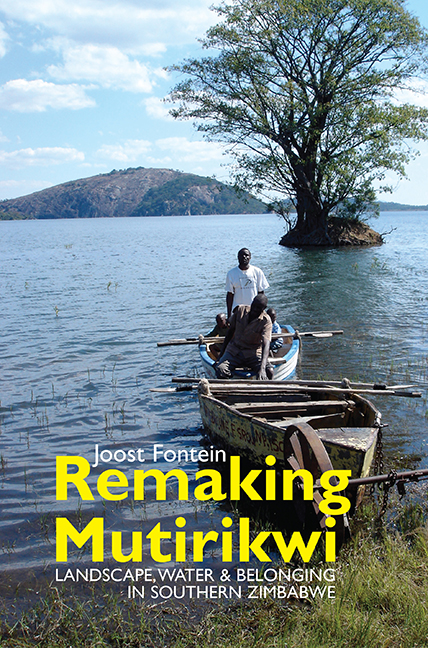Book contents
- Frontmatter
- Dedication
- Contents
- Illustrations
- Acknowledgements
- Note on Fieldwork, Notes & Sources
- Glossary
- Acronyms & Abbreviations
- Chronology
- Remaking Mutirikwi: An Introduction
- Part One Remaking Mutirikwi in the 2000s
- Part Two Damming Mutirikwi 1940s–1990s
- Epilogue: Remaking Mutirikwi in the late 2000s & early 2010s
- Bibliography
- Index
- Eastern African Studies
1 - New Farmers, Old Claims
Published online by Cambridge University Press: 11 June 2021
- Frontmatter
- Dedication
- Contents
- Illustrations
- Acknowledgements
- Note on Fieldwork, Notes & Sources
- Glossary
- Acronyms & Abbreviations
- Chronology
- Remaking Mutirikwi: An Introduction
- Part One Remaking Mutirikwi in the 2000s
- Part Two Damming Mutirikwi 1940s–1990s
- Epilogue: Remaking Mutirikwi in the late 2000s & early 2010s
- Bibliography
- Index
- Eastern African Studies
Summary
OPTIMISM, ENTHUSIASM AND HARD WORK
Gore rino ndinoda kusadza GMB nechibage changu!
[This year I want to fill up the Grain Marketing Board with my own maize!]
(New farmer, 19/12/05, Masvingo District)
But in terms of the broader vision, I have to stress that I think this land reform programme is one of the most wonderful programmes for a third world country to embark upon.
JF: So you are actually very optimistic?
Yes I am optimistic. I think it is a great thing for a third world country, it really is. (Chief Lands Officer, 5/06/06, Masvingo Province)
You asked me … what were the major changes that I have seen since the 1970s … and I said that at independence … there were very dramatic changes … in agricultural development and extension. But now, having had our conversation … I think that even the period we are going through now is one of profound … change. It is a very exciting period, especially in terms of land tenure … Since the 1980s there were not many changes in land tenure, but then all of a sudden in 2000 there was this revolution, which has thrown up all sorts of new challenges…. And some of us need to have a paradigm shift in the way that we do things.
(Provincial Agricultural Extension Service (AREX) Officer, 28/04/06, Masvingo Province)
One remarkable feature of the comments above is the optimism they convey. This optimism and enthusiasm of many involved in land resettlement around Mutirikwi in 2005/06, was remarkable in the face of not only the huge volume of criticism levied at Zimbabwe's agrarian reform programme, but also the severe economic, social and political problems that nearly all Zimbabweans faced throughout that decade. Accompanying land reform in the 2000s a new brand of ‘authoritarian nationalism’ (Raftopoulos 2003:217) emerged, involving increasingly ‘extreme and violent political intolerance’ (Alexander 2003:99) of any perceived opposition to the ruling party, as well as continuing economic decline, very high unemployment and, in 2005, a grossly disproportionate government attack on the informal economy and urban housing. All of this was punctuated by ever more restrictive legislation on citizenship, the media and NGOs, and by a series of controversial and sometimes violent elections (2000, 2002, 2005 and especially 2008).
- Type
- Chapter
- Information
- Remaking MutirikwiLandscape, Water & Belonging in Southern Zimbabwe, pp. 26 - 51Publisher: Boydell & BrewerPrint publication year: 2015

